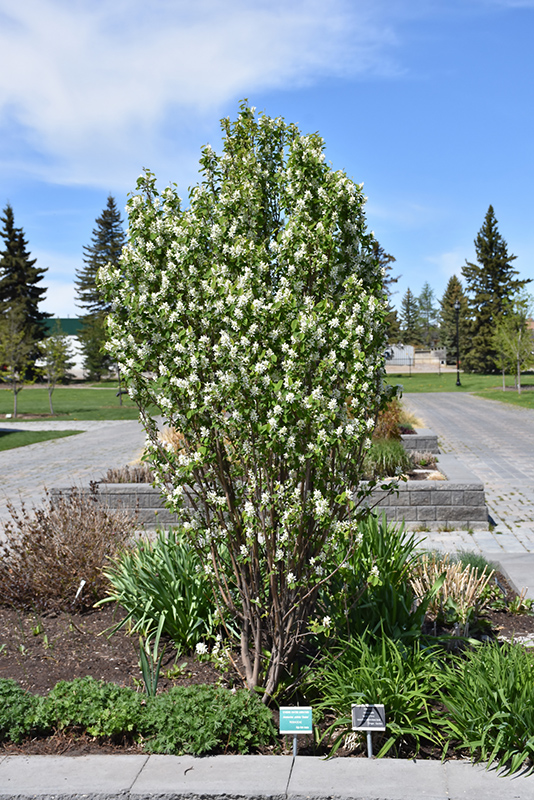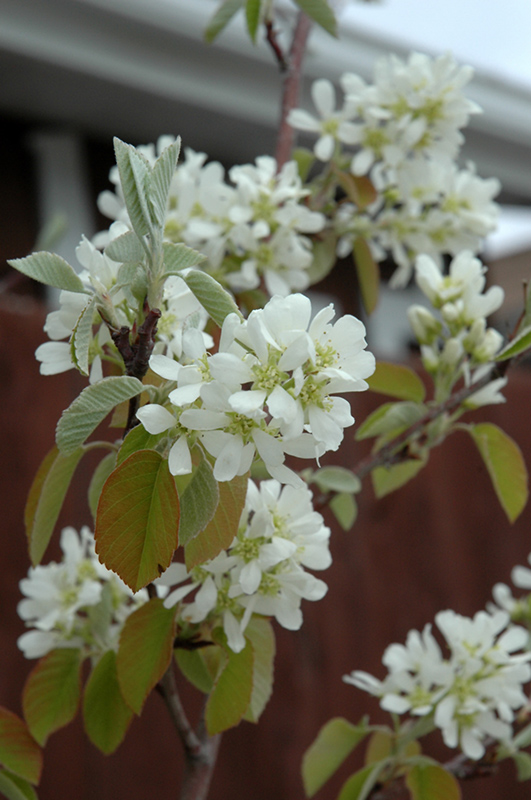PLANT FINDER
Standing Ovation™ Saskatoon Berry
Amelanchier alnifolia 'Obelisk'

Standing Ovation™ Saskatoon Berry in bloom
Standing Ovation™ Saskatoon Berry in bloom
(Photo courtesy of NetPS Plant Finder)

Standing Ovation™ Saskatoon Berry flowers
Standing Ovation™ Saskatoon Berry flowers
(Photo courtesy of NetPS Plant Finder)
Height: 12 feet
Spread: 6 feet
Sunlight:
![]()
![]()
Hardiness Zone: 2b
Other Names: Juneberry
Description:
With a rigidly upright and slender habit, this shrub also qualifies as a small tree, possibly reaching 15 feet; branches are smothered with pretty white flowers in early spring; makes a great accent in the garden
Ornamental Features
Standing Ovation™ Saskatoon Berry is primarily grown for its highly ornamental fruit. It features an abundance of magnificent deep purple berries from late spring to early summer. It is draped in stunning clusters of white flowers rising above the foliage from early to mid spring before the leaves. It has forest green deciduous foliage which emerges red in spring. The oval leaves turn an outstanding yellow in the fall.
Landscape Attributes
Standing Ovation™ Saskatoon Berry is a multi-stemmed deciduous shrub with a narrowly upright and columnar growth habit. Its relatively fine texture sets it apart from other landscape plants with less refined foliage.
This is a relatively low maintenance shrub, and is best pruned in late winter once the threat of extreme cold has passed. It is a good choice for attracting birds to your yard, but is not particularly attractive to deer who tend to leave it alone in favor of tastier treats. It has no significant negative characteristics.
Standing Ovation™ Saskatoon Berry is recommended for the following landscape applications;
- Hedges/Screening
- General Garden Use
- Naturalizing And Woodland Gardens
Planting & Growing
Standing Ovation™ Saskatoon Berry will grow to be about 12 feet tall at maturity, with a spread of 6 feet. It tends to be a little leggy, with a typical clearance of 2 feet from the ground, and is suitable for planting under power lines. It grows at a medium rate, and under ideal conditions can be expected to live for approximately 30 years. This is a self-pollinating variety, so it doesn't require a second plant nearby to set fruit.
This shrub does best in full sun to partial shade. It prefers to grow in average to moist conditions, and shouldn't be allowed to dry out. It is not particular as to soil type or pH. It is somewhat tolerant of urban pollution. This is a selection of a native North American species.
A NetPS Plant Finder tool
